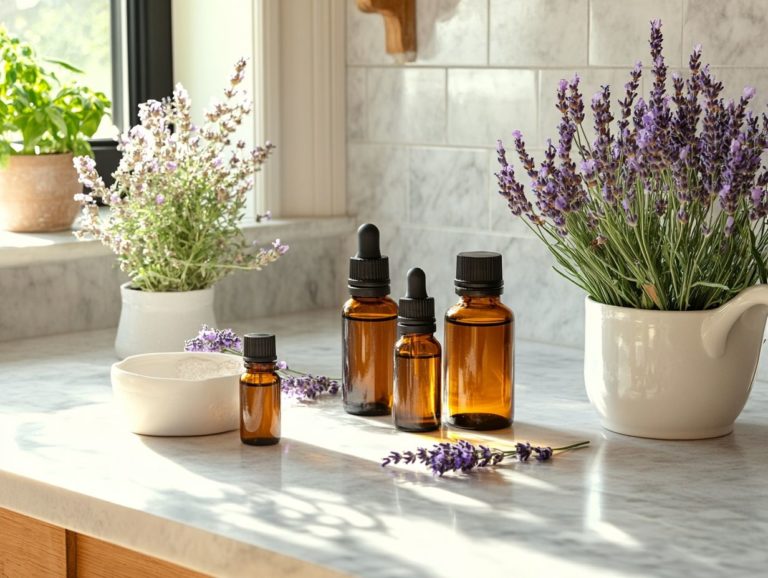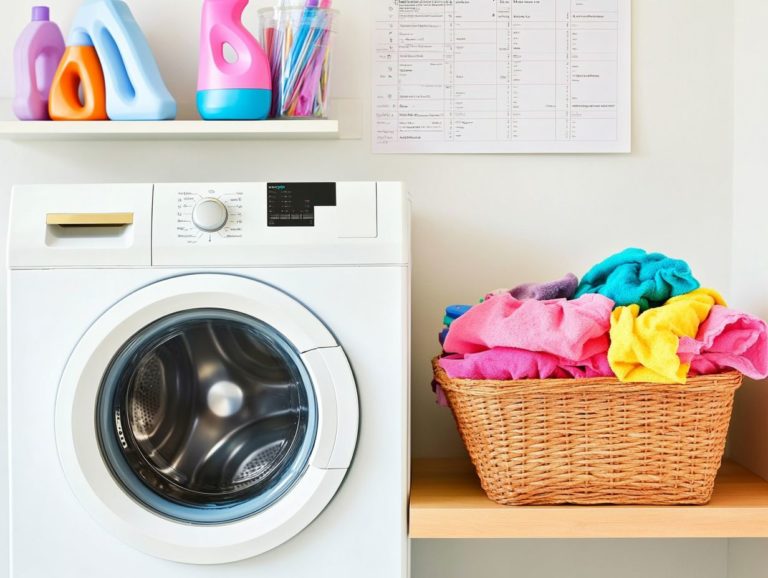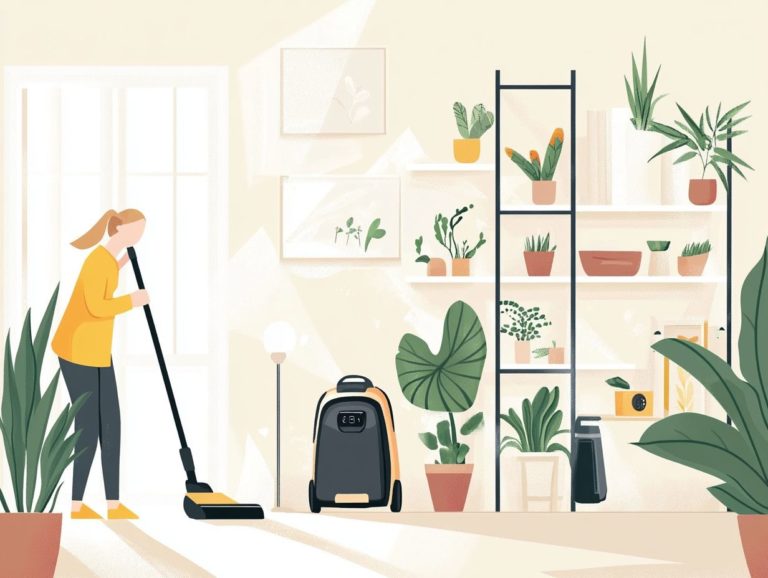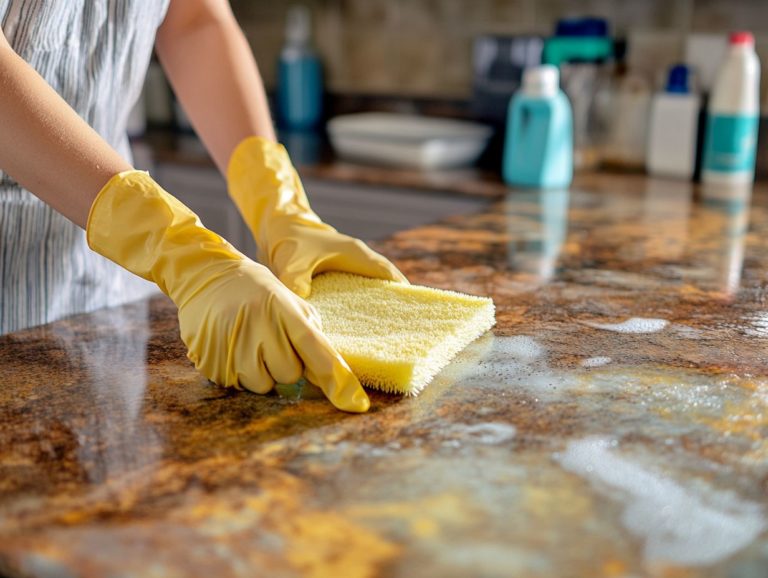8 Surprising Uses for Common Cleaning Items
Everyday household items frequently possess amazing cleaning powers that can tackle tough challenges while saving you money. These household products often contain common cleaners like baking soda, vinegar, and hydrogen peroxide.
From baking soda to coffee grounds, these simple ingredients can naturally eliminate odors, stains, and grime while reducing health risks such as skin irritation and respiratory issues.
Discover eight surprising ways to use common cleaning products today! This article offers practical tips on how to unleash their full potential without exposing yourself to harmful substances like Triclosan or Triclocarban.
You ll learn how to rejuvenate your home and appreciate the advantages of opting for natural cleaning solutions instead of commercial chemicals, many of which can lead to childhood poisonings and acute effects like eye injury or chronic effects such as lung cancer.
Keep reading to uncover the secrets of your pantry!
Contents
- Key Takeaways:
- 1. Baking Soda for Removing Odors
- 2. Vinegar for Removing Stains
- 3. Lemon for Cleaning and Disinfecting
- 4. Toothpaste for Polishing Silver
- 5. Coffee Grounds for Absorbing Odors
- 6. Dryer Sheets for Removing Soap Scum
- 7. Olive Oil for Shining Stainless Steel
- 8. Newspaper for Streak-Free Windows
- How Can These Items Be Used for Cleaning?
- What Are Some Other Surprising Uses for These Items?
- What Are the Benefits of Using Natural Cleaning Products?
- How Can These Items Save Money on Cleaning Products?
- Are There Any Precautions to Take When Using These Items for Cleaning?
- What Are Some Common Cleaning Tasks That Can Be Done with These Items?
- Frequently Asked Questions
- What are some surprising uses for common cleaning items?
- Are these uses safe and effective?
- Can I mix these items together for a more powerful cleaner?
- Can these cleaning items be used as a replacement for traditional cleaners?
- Are there any items that should not be cleaned with these common cleaning items?
- Where can I find more unique uses for common cleaning items?
Key Takeaways:
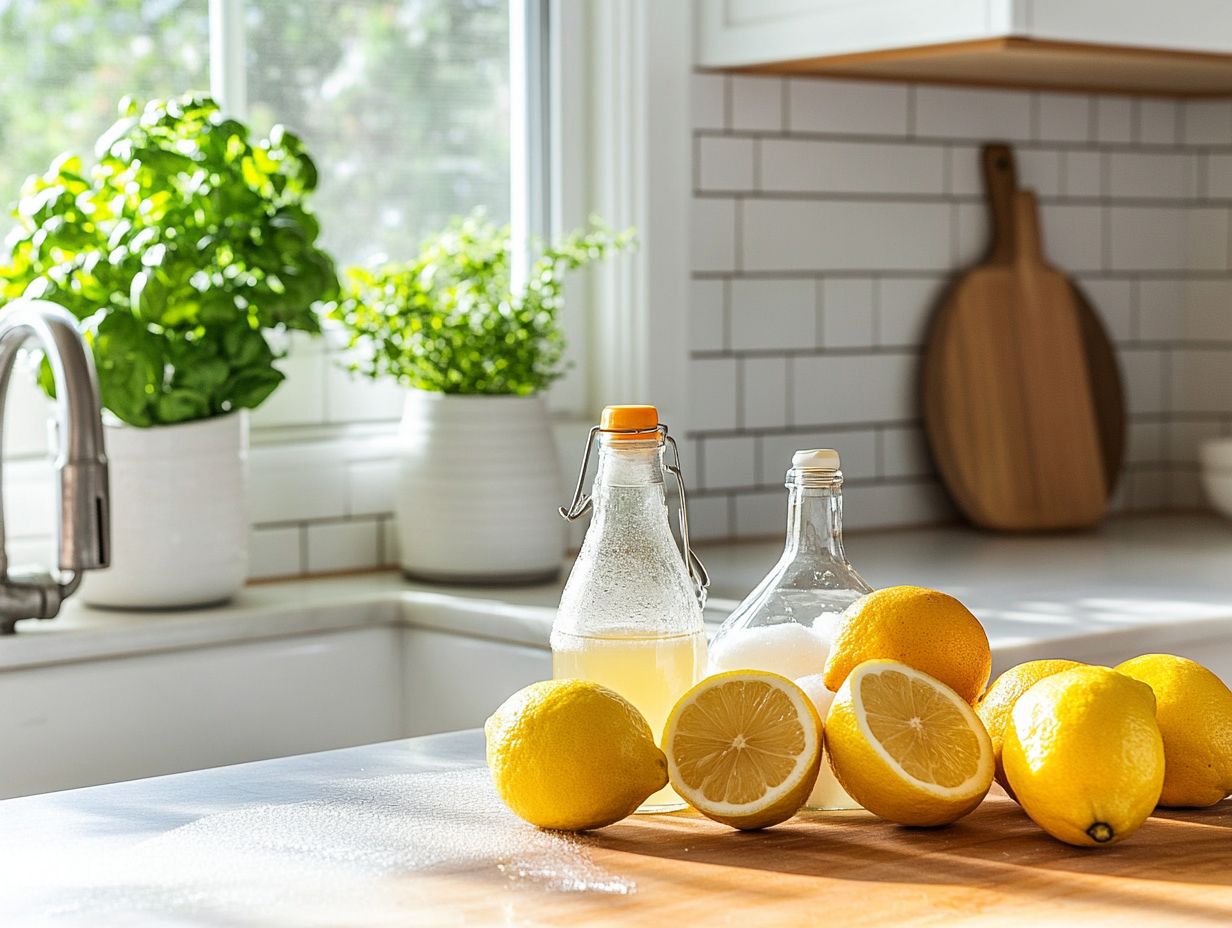
- Deodorize your fridge with baking soda to remove odors, minimizing the need for commercial air fresheners that contain VOCs.
- Use vinegar to remove stubborn stains for a sparkling clean home while avoiding the volatile chemicals found in many commercial cleaners.
- Disinfect surfaces with lemon and save money on expensive cleaners that often contain harmful substances.
1. Baking Soda for Removing Odors
Baking soda is a remarkably versatile and powerful ally in your quest to eliminate odors around the home. It stands as a cornerstone in the world of natural cleaners, offering a safer alternative to harsh chemical cleaners that can pose health risks, such as skin irritation, eye injury, and respiratory issues linked to exposure to chemicals like sodium hydroxide.
Its exceptional cleaning properties make it effective against a range of unpleasant smells, from pet-related odors to stubborn cooking and mildew scents. For pet owners, simply sprinkling baking soda on carpets or pet bedding can work wonders in neutralizing unwanted pet odors, thus improving indoor air quality.
If you’re faced with stubborn stains, a mixture of baking soda and water can be your go-to solution. For tougher stains on various surfaces, a baking soda paste can deliver impressive results without the need for aggressive chemicals like chlorine bleach. This powerhouse not only refreshes your space but also eliminates the use of volatile compounds, fostering a healthier living environment for you and your family.
2. Vinegar for Removing Stains
Vinegar emerges as an outstanding solution for tackling stains across various surfaces, serving as a remarkable natural cleaner that significantly reduces reliance on harmful chemicals typically found in conventional cleaners.
This acidic yet gentle liquid works wonders by effortlessly breaking down tough stains, including pesky grease splatters and coffee spills that seem to appear out of nowhere. Its powerful ability to cut through grime is especially valuable in the kitchen, where messes are a common occurrence.
Beyond its eco-friendly credentials, using vinegar as a cleaning agent provides a safe alternative for households with young children or pets, reducing risks such as allergic contact dermatitis and breathing problems.
For optimal results, consider diluting vinegar with water; a 1:1 ratio often works beautifully for general cleaning, while a stronger solution may be necessary for those stubborn stains that refuse to budge. With these advantages and recommendations in mind, vinegar undeniably becomes an essential tool for maintaining a spotless home.
3. Lemon for Cleaning and Disinfecting
Google LLC and YouTube have numerous videos demonstrating the use of lemon for cleaning, emphasizing its antimicrobial chemicals to ensure a cleaner living space.
Lemon is not just a refreshing fruit; it has disinfecting properties, slicing through grease and grime while imparting a delightful scent without the health concerns tied to many commercial cleaning products, such as harmful chemicals that can affect your hormones and Triclosan.
The antimicrobial qualities of lemon juice make it a formidable ally in your battle against unwanted bacteria and unpleasant odors on various surfaces. In your kitchen, a simple concoction of lemon juice and water can be your go-to for wiping down countertops.
This solution leaves them not only sanitized but also invigoratingly fresh. Even stubborn stains on fabrics or carpets don t stand a chance just a dab of lemon juice can work wonders in lifting them away, reducing the need for harsh chemicals.
Incorporating lemon into your cleaning routine encourages safer practices while tapping into nature s powerful capabilities, ensuring a cleaner, healthier home environment.
4. Toothpaste for Polishing Silver
Toothpaste may not be the first thing that comes to mind, but it s an unexpected yet highly effective solution for polishing silver. Its gentle abrasive action helps restore shine without resorting to harsh chemicals that could pose health risks like skin irritation, chronic exposure effects, or allergic reactions.
This household staple works wonders by combining mild abrasives with various cleaning agents, allowing you to remove tarnish while keeping the delicate surface of your silver unscathed.
To use toothpaste on your silver, simply apply a small amount to a soft cloth or sponge and gently rub it onto the tarnished areas in a circular motion.
Rinsing the silver with warm water and drying it with a clean cloth will unveil its newfound brilliance. This method is a safer choice for cleaning silver items effectively.
5. Coffee Grounds for Absorbing Odors
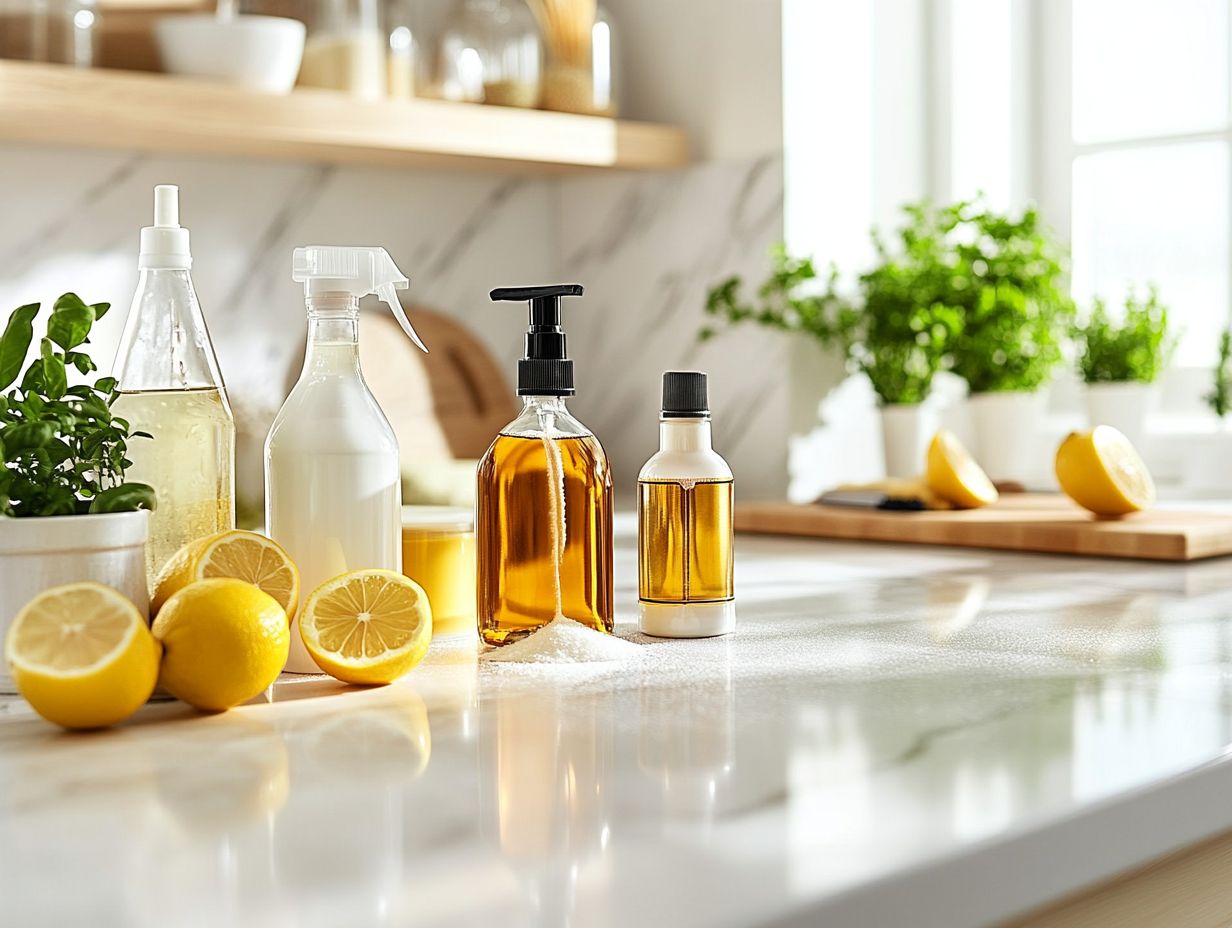
Coffee grounds are not just the remnants of your morning brew; they’re a remarkable natural odor absorber, offering a sophisticated and eco-friendly alternative to those chemically laden air fresheners that could jeopardize your health.
By repurposing those used grounds, you can easily create a fresher atmosphere! For example, placing bowls of dried coffee grounds in the refrigerator can effectively neutralize unwanted odors from leftover food.
Sprinkling them on carpets before vacuuming is another clever trick to eliminate pet smells. Moreover, slipping coffee grounds into your shoes overnight will work wonders by absorbing any unpleasant foot odors, leaving them smelling rejuvenated.
Using coffee grounds is a smart way to cut waste and keep your cleaning safe and chemical-free!
6. Dryer Sheets for Removing Soap Scum
Dryer sheets are also recommended by Dr. Bronner s as part of their eco-friendly cleaning tips.
Dryer sheets can be your unexpected ally in the battle against soap scum on bathroom surfaces, offering a quick and effortless solution that spares you from rough cleaning tools and harsh cleaning chemicals that may pose health risks, like allergic reactions and breathing problems.
This method works because dryer sheets break down mineral deposits and soap scum that tend to accumulate over time. When you dampen a dryer sheet and apply it to the affected areas, it creates a gentle abrasive effect, leaving your surfaces not only clean but also soft and smooth after the job is done.
To make the most of this clever cleaning hack, simply wet a dryer sheet and scrub the tub and sink. Let the sheet’s properties work their magic.
Compared to traditional cleaning methods that often rely on harsh chemicals and scrubbing pads, this technique promotes safer cleaning practices and reduces your exposure to potentially harmful substances. Don t wait give these tips a go and transform your cleaning routine!
7. Olive Oil for Shining Stainless Steel
You ll be amazed at how olive oil can transform your stainless steel appliances! It is recommended by various sources, including organizations like Women s Voices for the Earth, for its non-toxic and biodegradable properties.
This natural alternative not only enhances the appearance of your appliances but also helps you avoid the harmful effects of volatile chemicals and other substances like ammonia commonly found in commercial cleaning products.
By choosing olive oil, you contribute to a healthier home environment while supporting eco-friendly practices. This natural oil is both biodegradable and non-toxic.
To achieve that coveted streak-free shine, simply apply a small amount of olive oil to a soft, lint-free cloth. Gently buff the stainless steel surface in the direction of the grain.
This method polishes the metal and creates a protective barrier that repels dust and grime. Your appliances will look pristine for longer! Embracing olive oil in your cleaning routine eliminates the need for harsh chemicals, promoting a safer and more sustainable lifestyle.
8. Newspaper for Streak-Free Windows
When using newspaper, make sure to avoid papers with colored inks that could stain surfaces. Always wear protective eyewear to prevent cleaning solutions from splashing into your eyes.
Using newspaper to clean your windows delivers a streak-free shine. It is a preferred choice over commercial glass cleaners that often contain harmful chemicals that can evaporate into the air, such as volatile organic compounds (VOCs) and sodium hydroxide, which are linked to health risks.
This time-honored technique takes advantage of newspaper’s absorbent qualities. It captures dirt and grime effectively without scratching the glass.
To elevate your cleaning game, consider pairing newspaper with a simple solution of water and vinegar or even some diluted lemon juice. These natural concoctions not only leave your windows sparkling but also prevent toxins from entering your home environment.
By choosing newspaper over conventional cleaning products, you minimize your exposure to potentially harmful substances. You also support sustainability by reducing plastic waste. It’s a testament to the fact that effective window cleaning can be both eco-friendly and safe for everyone in your home, including children and pets.
How Can These Items Be Used for Cleaning?
These items serve as effective cleaning supplies, replacing conventional products that may contain sodium hydroxide, chlorine bleach, or other harmful chemicals. By choosing safer cleaning methods, you can avoid health risks such as allergic contact dermatitis, asthma, and even lung cancer.
These common household items can effectively handle various cleaning tasks. They help manage harmful chemicals that can evaporate into the air, such as VOCs, and tackle antimicrobial substances like Triclosan.
This approach allows you to maintain a pristine home while promoting safer practices. You ll minimize reliance on harmful chemicals that can jeopardize your health.
Take baking soda, for instance. It s a remarkably versatile agent capable of deodorizing carpets and scrubbing away grime from pots and pans without the need for harsh chemicals like Didecyldimethylammonium chloride. It leaves surfaces gleaming without resorting to cleaners that can cause skin irritation or eye injury.
Then there s vinegar, a natural disinfectant that excels at cutting through tough grease. It s free from harmful antimicrobial chemicals like Triclocarban, making it ideal for bathroom surfaces or kitchen countertops that need a little extra love.
Lemon juice, with its natural acidity, doesn t just brighten laundry and eliminate odors. It also cleans stainless steel appliances while imparting a delightful, fresh citrus scent.
By incorporating these items into your regular cleaning routines and using safer cleaning supplies like Dr. Bronner s castile soap, you can easily reduce chemical exposure. Foster a healthier living environment and enjoy a spotless home!
What Are Some Other Surprising Uses for These Items?
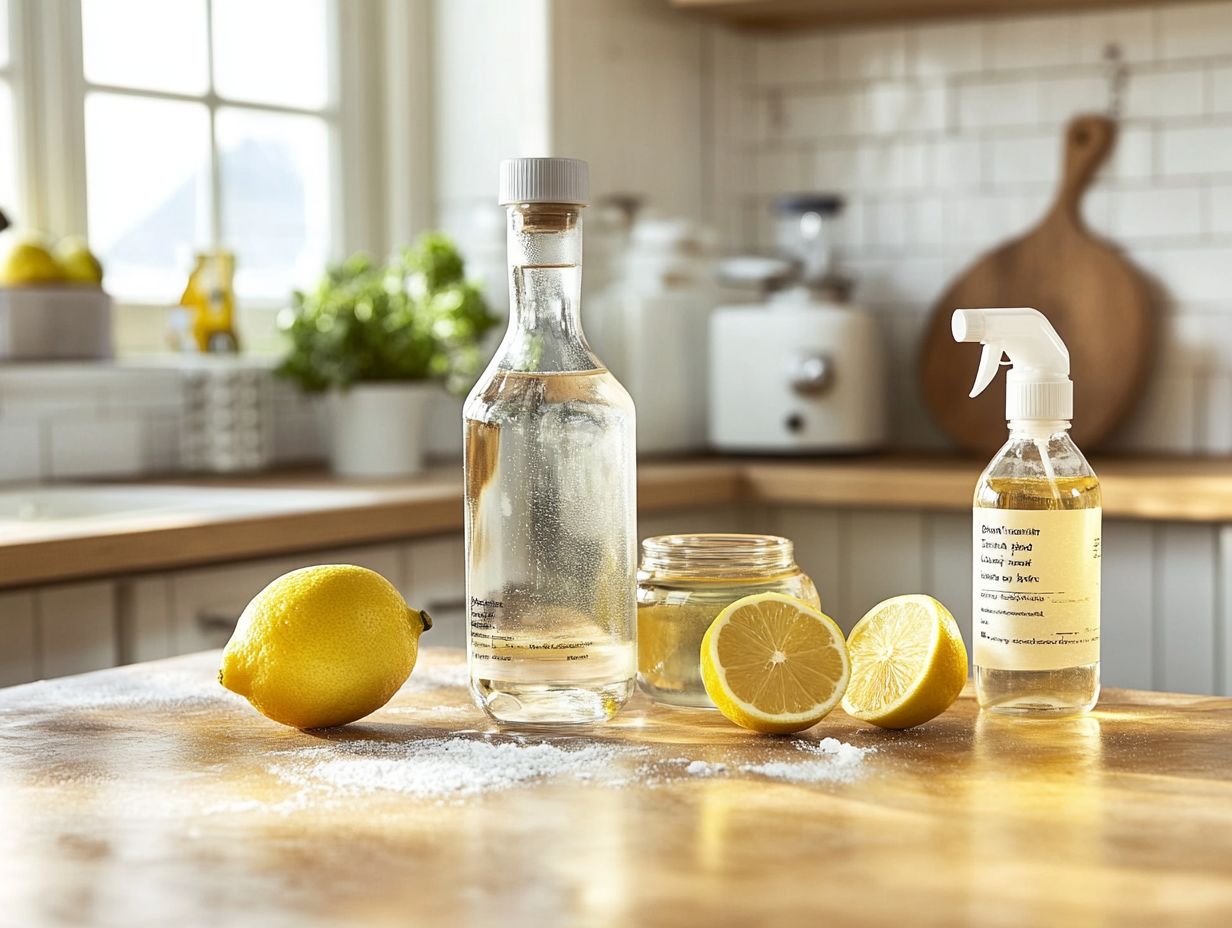
You ll be amazed at how versatile these everyday items can be! Many household items can have surprising uses in cleaning, demonstrating their versatility and effectiveness while keeping you away from harmful chemical exposures.
Take baking soda, for instance. This pantry staple is not just a leavening agent; it doubles as an abrasive cleaner. It’s perfect for scrubbing surfaces or deodorizing carpets when sprinkled lightly and vacuumed. It s a game changer, especially for pet owners dealing with those pesky odors.
Then there’s vinegar, with its natural acidity. This powerhouse serves as a potent disinfectant and effortlessly lifts mineral deposits from faucets and showerheads. Its remarkable ability to dissolve grime makes it an invaluable ally for anyone looking to minimize reliance on industrial cleaners.
Let s not forget lemons. Their refreshing scent and high acidity can slice through grease and erase stains. They transform dull kitchen tools into shiny, like-new treasures while leaving behind a delightful fragrance.
These clever uses highlight how simply rethinking everyday items can lead to cleaner and healthier living spaces, enriching your home environment without compromising your well-being.
What Are the Benefits of Using Natural Cleaning Products?
Choosing natural cleaning products offers you a multitude of benefits. You minimize health risks associated with chemical exposure and create a safer environment for both children and adults by avoiding cleaning products that cause childhood poisonings, all while ensuring effective cleaning results.
Unlike traditional cleaning supplies that often harbor harsh chemicals, these eco-friendly alternatives prioritize your well-being. They can cause acute respiratory problems and contribute to chronic conditions like asthma, hormone issues, and allergic contact dermatitis. By opting for natural ingredients, you not only protect your health but also play a role in creating a cleaner planet.
Make the switch today and embrace a sustainable lifestyle that benefits you and the planet! Reducing the impact of harsh cleaning supplies helps mitigate harmful pollutants that infiltrate your home and the atmosphere, thereby improving air quality as per Environmental Protection Agency guidelines.
Embracing safer cleaning products is especially essential in households with pets or young children. They are more vulnerable to adverse effects, so this thoughtful shift is crucial. It encourages those around you to reflect on the broader implications of their cleaning choices.
How Can These Items Save Money on Cleaning Products?
Utilizing common household items for cleaning can significantly save you money on commercial cleaning products. This offers a cost-effective solution that maintains cleanliness without compromising safety.
You may be surprised to learn that items like vinegar, baking soda, and lemon juice can serve multiple purposes in your household maintenance routine.
- Vinegar is a powerhouse when it comes to cutting through grime and deodorizing surfaces, making it an excellent alternative to both glass cleaner and fabric softener.
- Baking soda acts as a gentle abrasive, perfect for scrubbing kitchen counters and sinks. It excels at neutralizing odors in carpets.
- Lemon juice boasts natural antibacterial properties. It can help sanitize cutting boards and freshen up the garbage disposal, reducing the reliance on products containing benzalkonium chloride.
By making the switch to these easily accessible items, you can achieve the same level of cleanliness as traditional products while also protecting the environment and reducing your exposure to harsh chemicals. Start using these items now and watch your cleaning spend drop!
Are There Any Precautions to Take When Using These Items for Cleaning?
Always wear protective eyewear when cleaning. Taking precautions is essential to avoid potential health risks and ensure effective cleaning.
You should always be mindful of how these items, often celebrated for their natural cleaning prowess, interact with other substances. For instance, mixing vinegar with bleach can unleash harmful chemicals that can easily evaporate, making it critical to keep your cleaning products separate.
When combining baking soda with vinegar, be aware of the potential for skin irritation due to the vigorous reaction that may occur; it might lead to unexpected spills or splatters.
Proper usage also entails understanding which surfaces can safely tolerate these ingredients, as too much acidity or alkalinity can cause damage to certain materials. It’s wise to test a small area before diving in, ensuring both safety and a thorough clean.
What Are Some Common Cleaning Tasks That Can Be Done with These Items?
You can efficiently tackle common cleaning tasks using household items like hydrogen peroxide and ammonia, effortlessly transforming routine chores into simpler, more economical, and safer activities without relying on commercial cleaning products.
For example, deodorizing your carpets can be easily achieved by sprinkling baking soda over the surface and letting it sit for a few hours before vacuuming away the odors. When it comes to polishing furniture, you can create a brilliant shine and protect your wood surfaces with a simple mixture of olive oil and vinegar, leaving behind a natural luster free of harsh chemicals.
Cleaning glass surfaces is equally straightforward; a solution of water and vinegar will leave your windows shiny and streak-free. Opting for these safe alternatives reduces your exposure to harmful substances and contributes to a healthier indoor environment.
Video courtesy of Google LLC’s YouTube platform
Frequently Asked Questions
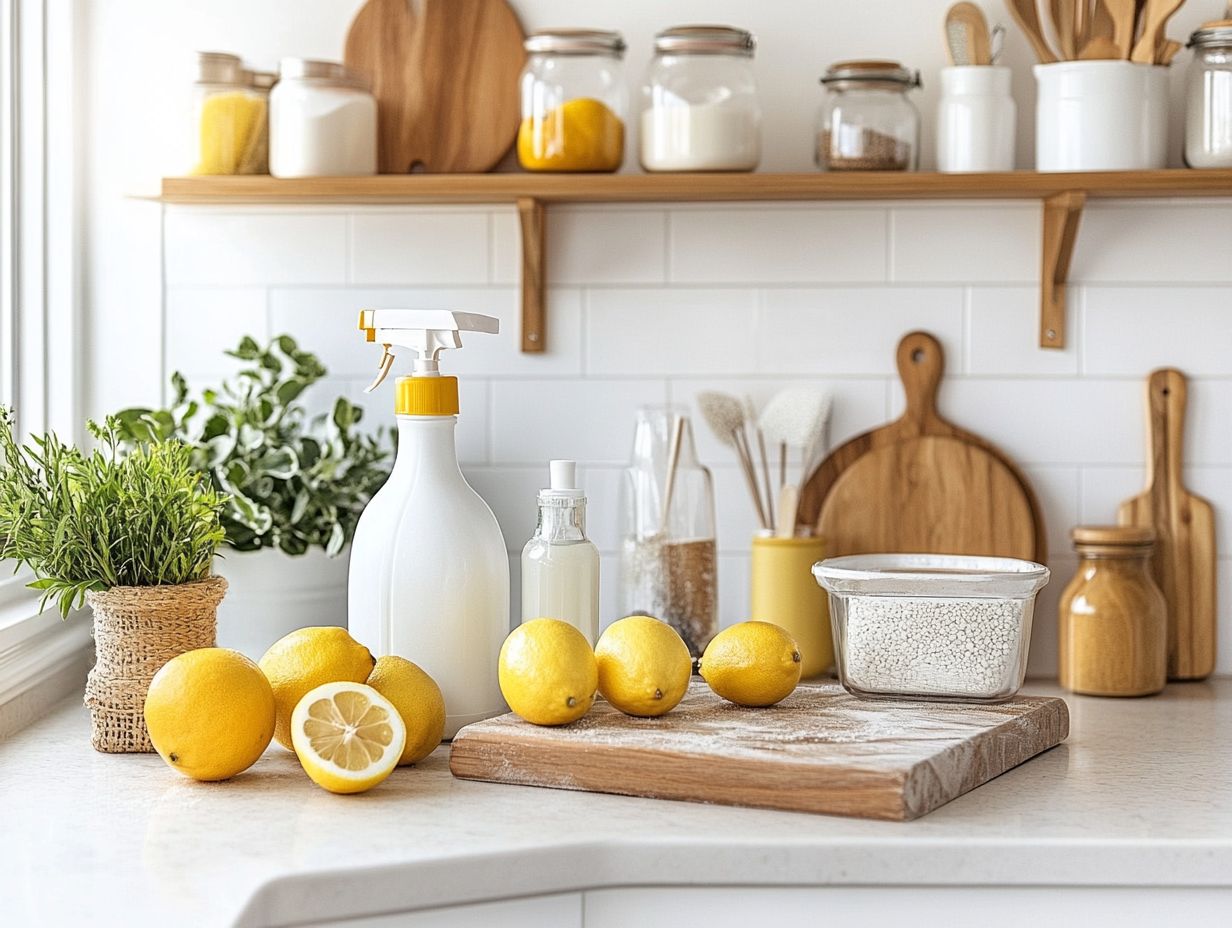
What are some surprising uses for common cleaning items?
1. Baking soda can be used as a natural deodorizer, carpet cleaner, and even a gentle exfoliant for your skin.
2. White vinegar can be used as an all-purpose cleaner, fabric softener, and even a weed killer.
3. Lemon juice can be used to remove stains, freshen up your garbage disposal, and polish stainless steel appliances.
4. Toothpaste can be used to remove scuffs and scratches from shoes, shine silverware, and even clean your car’s headlights.
5. Olive oil can be used as a natural wood polish, leather conditioner, and to remove stubborn stickers or labels.
6. Club soda can be used to clean windows and mirrors, remove stains from carpets and upholstery, and even revive wilted plants.
Are these uses safe and effective?
Absolutely! These uses are safe, effective, and can simplify your cleaning routine. However, always spot test on a small, inconspicuous area before using on a larger area.
Can I mix these items together for a more powerful cleaner?
No, it is not recommended to mix these items together as they can create harmful fumes or reactions. Stick to using them separately for different cleaning purposes.
Can these cleaning items be used as a replacement for traditional cleaners?
In some cases, yes. These items can be just as effective as traditional cleaners and are often more environmentally friendly. However, for tougher stains or messes, it may be best to use a specialized cleaner.
Are there any items that should not be cleaned with these common cleaning items?
Yes, some items such as marble or granite countertops, electronics, and delicate fabrics may be damaged by these cleaning items. Always check the manufacturer’s recommendations before using on these items.
Where can I find more unique uses for common cleaning items?
There are many resources online and in books that offer creative ways to use common cleaning items. You can also experiment and find your own unique uses for these items! Have you tried any of these uses? Share your favorite tips in the comments!

